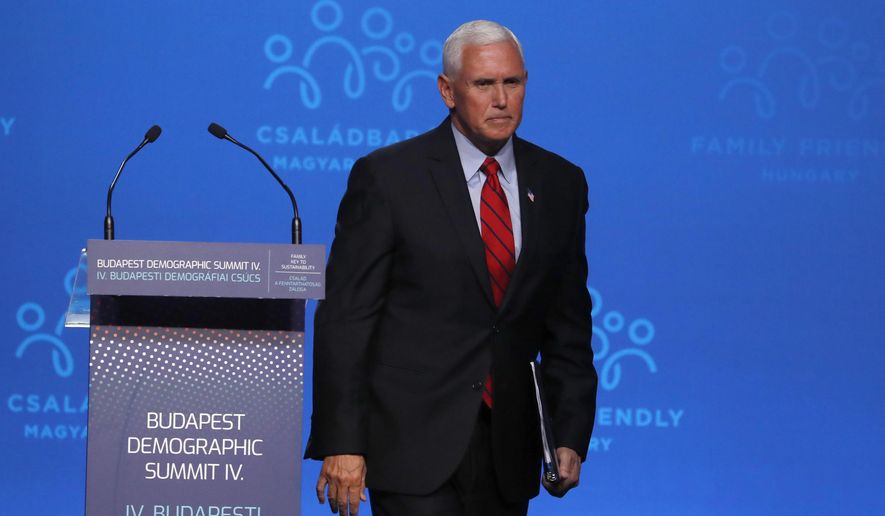Former Vice President Mike Pence is weighing in on a pending case before the Supreme Court on the right of a public school teacher to pray.
Joseph Kennedy, a public high school assistant football coach in Bremerton, Washington, regularly kneeled and said a prayer on the 50-yard line after games, described in court papers as a “quiet prayer of gratitude.” School district officials blocked him from doing so, and he was put on leave and eventually lost his job.
He challenged the praying ban in court but the U.S. Circuit Court of Appeals for the 9th Circuit sided with the school, saying that Mr. Kennedy’s prayer clashed with the Constitution’s Establishment Clause, which prohibits government entanglement — or endorsement — of religion.
Mr. Kennedy is asking the high court to review his case, claiming the First Amendment protects his actions.
And Mr. Pence is on his side, with his organization Advancing American Freedom filing a brief with the high court Monday arguing that if the Ninth Circuit’s ruling is allowed to stand, it will curtail free speech rights.
“Americans of faith do not turn their devotion off and on like a light switch, and we must reject any attempt by the government to control private religious expression — especially those who call on their faith when answering the call to participate in public service,” said Mr. Pence, founder of AAF, a conservative nonprofit.
“Advancing American Freedom will always stand up to unconstitutional restrictions on personal religious expression and the free exercise of religion that are the lifeblood of our Republic,” he added.
Michael B. Tierney, an attorney for the school district, said it’s a “deceitful narrative” to describe Mr. Kennedy’s case as an employee’s right to private prayer.
“This case is not about Kennedy praying silently and alone, as his attorneys contend; the Ninth Circuit decided the case based on the actual facts: ‘This case requires us to decide whether Bremerton School District would have violated the Establishment Clause by allowing Joseph Kennedy, a high school football coach, to engage in demonstrative religious conduct immediately after football games, while kneeling on the field’s fifty-yard line, surrounded by many of his players, and occasionally members of the community,’” he said.
Richard B. Katskee, vice president and legal director for Americans United for Separation of Church and State, said the Ninth Circuit got the ruling right.
“The Bremerton School District was correct to protect the religious freedom of its students and their families,” Mr. Katskee said. “The Constitution requires public schools to provide an inclusive and welcoming environment for all students, regardless of their religious beliefs. That includes ensuring that student-athletes don’t feel compelled to pray or participate in religious activities to secure their place on a team.
“If the Supreme Court is interested in a case about personal, private religious activity by public-school employees, this just isn’t that case. The Supreme Court normally isn’t — and isn’t supposed to be — interested in fact-bound applications of settled law. And it certainly shouldn’t have any stomach for undermining the religious freedom of the students and their families,” he added.
It would take four justices to vote in favor of reviewing the case for it to get granted a hearing.
• Alex Swoyer can be reached at aswoyer@washingtontimes.com.




Please read our comment policy before commenting.